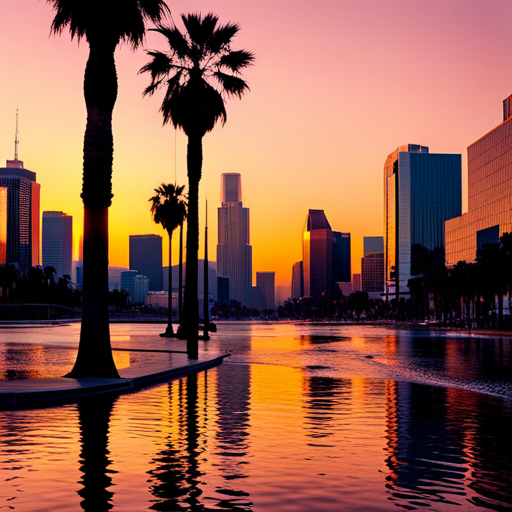Are you tired of dealing with dingy clothes, dry hair, and brown stains on your plumbing fixtures? You’re not alone. Los Angeles residents have been struggling with hard water for years.
With an average hardness concentration of 127 ppm and 7.4 gpg, it’s no surprise that this is a common issue throughout the city. But what exactly is hard water, and why is it causing so many problems for Angelenos?
Hard water contains high levels of calcium and magnesium, which can lead to plumbing and appliance problems, as well as a range of cosmetic issues. If you’re tired of constantly scrubbing away brown stains on your sinks and toilets, or dealing with dry, itchy skin and hair, it’s time to take action.
In this article, we’ll explore the impact of hardness and contaminants on Los Angeles’ water supply, and discuss potential solutions to these water woes. Whether you’re a homeowner or a renter, it’s important to know what you’re up against when it comes to LA’s water quality, and how you can protect yourself and your home.
Key Takeaways
– Over 90% of California has hard water, including Los Angeles with an average hardness of 127 ppm.
– Hard water can cause plumbing and appliance problems, brown stains, dry hair and skin, and dingy clothes.
– Los Angeles tap water is considered to be safe to drink despite being hard and comes from three main sources: the Los Angeles aqueducts, local groundwater, and supplemental water from the Metropolitan Water District.
– Los Angeles tap water has detectable levels of several contaminants, including trihalomethane, chromium 6, and lead, but Los Angeles County Waterworks Districts routinely tests water for contaminants.
Hard Water in LA
You may be experiencing plumbing and appliance problems, brown stains, dry hair, and skin, and dingy clothes in Los Angeles due to the high levels of calcium and magnesium in the hard water.
This is a common issue throughout the Los Angeles area, with over 90% of California having hard water, including Los Angeles with an average hardness of 127 ppm.
The concentration of calcium is high in Los Angeles groundwater due to calcium carbonate in the soil, and the Metropolitan Water District also provides hard water to Los Angeles due to the water’s long transportation and contact with calcium-containing structures.
The effects of hard water on skin and hair can be unpleasant, with the minerals causing dryness and irritation.
Fortunately, installing a water softener system can alleviate these issues. Water softeners use an ion exchange resin to remove calcium and magnesium, resulting in softer and healthier skin and hair.
Additionally, using bottled or filtered water for drinking and cooking can also be an alternative to tap water.
Reducing Hard Water
Installing a whole-house water softener system can effectively remove calcium and magnesium, reducing the hardness of your tap water. This can lead to several benefits for your home and family. Firstly, it can increase the lifespan of your household appliances such as dishwashers, washing machines, and water heaters. Hard water can cause buildup and damage to these appliances, leading to costly repairs or replacements. By reducing the hardness of your water, you can avoid these issues and save money in the long run.
Secondly, soft water can also have benefits for your skin and hair. Hard water can cause dryness and irritation, which can be particularly problematic for those with sensitive skin. By using a water softener, you can enjoy softer, smoother skin and healthier-looking hair. So if you’re tired of dealing with the negative effects of hard water, consider investing in a water softener system and start enjoying the benefits today.
| Water Softener Benefits | Impact of Hard Water on Appliances | ||
|---|---|---|---|
| Increases lifespan of household appliances | Causes buildup and damage | ||
| Saves money on repairs and replacements | Costly to fix | ||
| Softens skin and hair | Can cause dryness and irritation | ||
| Improves overall water quality | Can lead to dingy clothes and stains | Reduces the amount of soap and detergent needed for cleaning | May leave a soapy residue on dishes and surfaces |
Contaminants in Tap Water
If you’re concerned about the safety of your drinking water, it’s important to be aware of the detectable levels of several substances found in tap water.
Los Angeles tap water has detectable levels of trihalomethane, chromium 6, and lead, among other contaminants. Trihalomethane is a byproduct of the disinfection process and has been linked to health risks such as cancer and reproductive problems. Chromium 6 is a naturally occurring metal that can cause cancer and other health issues if consumed in high levels over a long period of time. Lead is a toxic metal that can cause developmental and neurological problems, especially in children.
To reduce the concentration of these contaminants in your drinking water, you can consider adding water treatment to your tap water. Reverse osmosis systems can remove many contaminants, including trihalomethane, chromium 6, and lead. Activated carbon filters can also be effective at removing some contaminants.
It’s important to note that while Los Angeles County Waterworks Districts does test for these contaminants, they do not provide treatment to reduce their concentrations in tap water. Therefore, it’s up to individuals to take action to ensure the safety of their drinking water.
Conclusion
Congratulations! You’ve learned about the water challenges faced by Los Angeles. These include hard water with high calcium and magnesium levels, and detectable levels of contaminants such as trihalomethane, chromium 6, and lead.
These issues can cause plumbing and appliance problems, brown stains, dry hair and skin, and dingy clothes. However, there are solutions to these water woes.
Reducing hard water can be achieved through water softening treatments, while installing filters can help remove contaminants from tap water. It’s important to take these steps to ensure that the water you use in Los Angeles is safe and healthy for you and your family.

